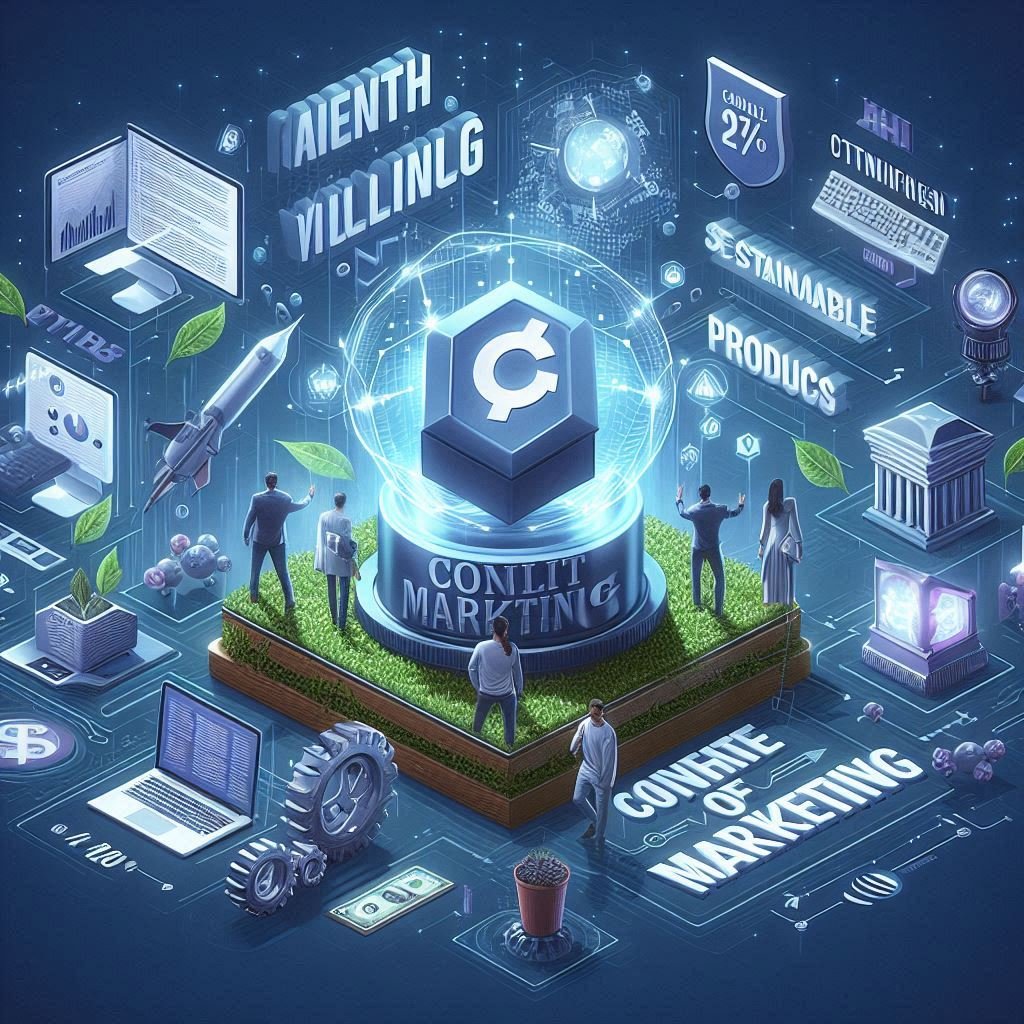Introduction to Affiliate Marketing

Understanding Affiliate Marketing
Affiliate marketing is a dynamic method of earning income by promoting products and services online. This performance-based marketing model allows individuals to earn commissions by recommending products they trust, making it an ideal business model for those passionate about health and wellness, personal finance, and sustainable living. By joining high-quality affiliate marketing programs (Authority Hacker), marketers can connect with brands that resonate with their values and audience—creating a win-win for both creators and companies.
In the health and wellness affiliate niche, opportunities are vast. From fitness trackers and yoga mats to nutrition supplements and mental health apps, affiliates can promote trusted brands to audiences seeking reliable solutions for their well-being. This niche caters not only to individual health goals but also to growing global trends such as mindfulness, organic living, and holistic healing, making it especially profitable for content creators, bloggers, and influencers.
Expanding Beyond Health: Affiliate Versatility
Affiliate marketing isn’t limited to wellness. Its application spans across industries like travel, finance, online education, and eco-friendly products. For example, travel bloggers can promote wellness retreats (BookRetreats), while finance bloggers might suggest health-focused investments like gym franchises or wellness ETFs. The key to success is authentic alignment: the more relevant a product is to your niche audience, the higher your conversion rate will be.
Leveraging Technology in Affiliate Marketing
Technology plays a transformative role in affiliate marketing. Platforms like ShareASale, CJ Affiliate, and Impact make it easier than ever to manage affiliate campaigns, track clicks, and analyze performance. Understanding analytics, consumer behavior, and content SEO is critical to maximize affiliate earnings. For students, solopreneurs, and small business owners, these tools offer scalable ways to build a passive income stream while focusing on building long-term value.
💡 Tip: Use tools like Google Analytics and SEMrush to track content performance and refine your affiliate strategy.
Final Thoughts
Affiliate marketing offers vast potential for individuals across all walks of life. Whether you’re a real estate agent recommending wellness services, a student writing about nutrition, or a freelancer blogging about eco-friendly home products, this model can be customized to your strengths. By harnessing personal passion, leveraging tech tools, and staying aligned with your audience’s interests, affiliate marketing becomes not just a side hustle—but a path toward financial freedom and purpose-driven work.
The Growth of Health and Wellness Niches
Wellness as a Global Movement
The global wellness market (Global Wellness Institute) is now worth over $4.4 trillion and continues to grow. This explosion has created numerous profitable niches within affiliate marketing—such as functional nutrition, mental health, fitness, biohacking, natural supplements, and non-toxic skincare. These trends are deeply aligned with modern consumers’ desire for preventive health, holistic healing, and sustainable lifestyles.
A Perfect Fit for Students and Entrepreneurs
Affiliate marketing in wellness is particularly attractive to students, freelancers, and small business owners. It offers low entry costs and high flexibility—allowing individuals to build digital income while pursuing studies or other ventures. Platforms like Awin, Rakuten, and Amazon Associates make it easy to start recommending wellness products from top brands.
With tools like TikTok, Instagram, Pinterest, and YouTube, reaching niche audiences has never been easier. These platforms support micro-influencer marketing, where even small accounts can generate significant revenue by sharing authentic, value-based content.
Wellness Meets Travel, Lifestyle, and Education
An exciting sub-niche is the intersection of wellness with travel and lifestyle. Wellness retreats, eco-lodges, spa vacations, and yoga teacher training trips are becoming more mainstream—and affiliates can monetize this trend. Sites like Retreat Guru and WellnessLiving offer affiliate programs tailored to these experiences.
Meanwhile, online education is booming. Health courses on platforms like Udemy and Coursera often offer affiliate commissions. Promoting certifications in nutrition coaching, fitness instruction, or mental health counseling adds depth to an affiliate’s content offerings—and can establish them as a trusted voice in their niche.
Why Choose Affiliate Marketing?
Low Barrier to Entry and High Flexibility
Affiliate marketing offers a unique opportunity for individuals looking to earn income online with minimal upfront investment. It requires no inventory, no customer service, and little technical overhead—making it ideal for beginners. Whether you’re a college student, freelancer, or small business owner, you can start with just a blog, a YouTube channel, or even a newsletter.
Its flexibility is unmatched: you can work remotely, create content on your schedule, and scale your efforts over time. This freedom is especially valuable in today’s remote-first economy, where digital entrepreneurship is thriving.
📘 Related: How to Start Affiliate Marketing with No Money (BigCommerce)
Partnering with Trusted Brands
One of the strengths of affiliate marketing is the ability to promote established brands. Whether it’s recommending popular health supplements like those from Thorne or sustainable lifestyle products from EarthHero, affiliates can benefit from the trust and authority these companies already have with consumers.
This relationship boosts credibility and enhances conversion rates—especially when the affiliate authentically uses and believes in the product.
Authenticity and Storytelling Drive Success
Today’s audiences are savvy. They prefer real stories and relatable content over generic promotions. This is where affiliate marketing excels: it lets you share personal experiences, offer genuine reviews, and build meaningful connections with your followers. The more authentic your storytelling, the better your chances of building trust and generating income.
High-performing content types include:
- Product reviews
- Tutorials and how-tos
- Top 10 product lists
- “What’s in my bag” or “Day in the life” posts
- Instagram Reels and TikTok demos
Earning Passive Income Over Time
The biggest appeal of affiliate marketing? Passive income. Once your content is live and ranking, you can earn commissions around the clock—even while you sleep. With consistent content creation and SEO optimization, your efforts can snowball into recurring revenue.
Pair this with email marketing tools like ConvertKit or Mailchimp to keep nurturing your audience and boosting conversions long-term.
Final Thoughts
Affiliate marketing is no longer just a side hustle—it’s a legitimate path to full-time income, especially in growing sectors like health and wellness, sustainable living, and online education. With low startup costs, the ability to work remotely, and endless niches to explore, it’s an ideal model for anyone seeking financial independence through digital entrepreneurship.
By choosing the right niche, building trust through honest content, and staying informed with tools and trends, you can create a sustainable business that grows with you.
Setting the Foundation

Identifying Your Passion and Niche
Identifying your passion and niche is a foundational step in building a successful career in affiliate marketing (BigCommerce), especially within the dynamic and evergreen health and wellness niche. Whether you’re a student looking to earn online, a real estate professional seeking passive income, or a small business owner diversifying revenue streams, finding a niche that aligns with your interests, skills, and values will dramatically increase your success and fulfillment.
Start by reflecting on your hobbies, areas of expertise, and what topics you can talk about effortlessly. Are you passionate about fitness, nutrition, natural skincare, or mental wellness? If yes, then the health and wellness niche offers countless affiliate programs (Influencer Marketing Hub) that align with your goals.
Research Trending and Profitable Niches
Researching potential niches is essential. Use tools like Google Trends and Ubersuggest to identify trending topics in wellness, sustainable living, personal finance, and eco-friendly products. Subscribe to newsletters from leading health brands and browse top affiliate networks such as ShareASale, CJ Affiliate, and Impact to see what’s currently in demand.
Engaging in communities like Reddit’s affiliate marketing subreddit or Quora helps you understand real consumer pain points and trending questions. This insight can guide you toward high-converting sub-niches.
Test and Validate Through Content
Testing your ideas through content creation is an important step. Launch a WordPress blog or YouTube channel dedicated to your niche. Share tutorials, personal experiences, product reviews, and expert interviews. Use platforms like Canva to create visually appealing content and Buffer to schedule posts across social media.
As your content gains traction, analyze what resonates most using tools like Google Analytics or Hotjar. This testing phase is critical for finding product-market fit and growing your loyal audience.
Align Passion with Long-Term Profitability
Remember, choosing a niche isn’t just about chasing commissions. It’s about building a brand around something meaningful. When your content is authentic, passionate, and informative, it builds trust, which is the cornerstone of successful affiliate marketing.
Researching Affiliate Programs
Choose Affiliate Programs That Align with Your Niche
Once your niche is defined, it’s time to explore high-paying affiliate programs that align with your audience’s needs. For example, if your content focuses on natural wellness or clean eating, check out the Thorne or Organifi affiliate programs.
Affiliate marketplaces like ClickBank and Rakuten Advertising offer thousands of programs across health, finance, tech, and lifestyle verticals. Use filters to select offers based on payouts, conversion rates, and commission structures.
Evaluate Reputation and Support
Before joining, evaluate each program’s reputation. Use sites like Trustpilot or search “[Program Name] affiliate reviews” to learn from other marketers’ experiences. Look for:
- On-time payments
- Transparent commission tracking
- Helpful affiliate support
- Access to affiliate dashboards like PartnerStack
Understand Commission Structure and Payment Terms
Every program is different. Some offer one-time payouts, others provide recurring commissions (ideal for subscription-based products). Compare offers carefully. For instance, SaaS health tools or coaching programs often offer long-term residual income.
If you’re just starting out, you may benefit more from programs with low-entry barriers and cookie durations of 30–90 days—increasing your chances of earning.
Use Tools and Resources Provided
Top-tier affiliate programs provide marketing resources like email templates, banners, product photos, and even social media content. This can save you time while ensuring you stay compliant with the brand’s messaging.
Check if the program integrates with tracking platforms like Tapfiliate or Refersion, which make tracking conversions easier and more transparent.
Stay Updated on Market Changes
Affiliate marketing is ever-changing. Stay ahead by following blogs like Smart Passive Income, Affiliate Summit, or Awin. Subscribe to newsletters, attend virtual conferences, and remain agile in adjusting your program portfolio.
Building Your Online Presence
Create a High-Converting Website
Your website is your digital storefront. Use platforms like Squarespace or Wix to create a visually appealing site. Be sure to:
- Include an “About Me” page to build credibility
- Publish SEO-optimized blog posts using SurferSEO or Yoast SEO
- Embed affiliate links using tools like ThirstyAffiliates
Include a newsletter signup via MailerLite or ConvertKit to grow an email list—an essential asset for affiliate marketers.
Leverage Social Media for Growth
Use Instagram and TikTok to showcase lifestyle content related to your niche. Share transformation stories, product use cases, behind-the-scenes moments, and more.
Utilize platform-specific tools like Meta Business Suite for Facebook/Instagram and Creator Studio for monetization tracking and scheduling.
Optimize with SEO Best Practices
Using relevant keywords like “best wellness supplements 2025,” “eco-friendly skincare reviews,” or “top affiliate programs for students” increases your chances of ranking on Google.
Use Ahrefs or SEMrush to conduct keyword research. Optimize your meta tags, headings (H1, H2, H3), alt text, and internal linking structure.
Build Trust Through Networking
Engage in Facebook groups, attend webinars, or collaborate with YouTubers and bloggers in your niche. Platforms like Alignable and LinkedIn Groups offer networking opportunities that lead to guest post exchanges, backlinks, and co-marketing deals.
Be Consistent and Authentic
The most successful affiliate marketers post regularly and consistently across platforms. Maintain a posting schedule using tools like Notion or Trello, and make sure each post provides value, not just sales pitches.
Authenticity fosters trust—so only promote products you believe in and have either tested or researched thoroughly.
Final Thoughts
Setting a solid foundation in affiliate marketing begins with aligning your personal passions with a profitable niche, choosing reputable affiliate programs, and creating a strong online presence. Whether you’re in the health and wellness, eco-friendly living, or digital finance niche, your success depends on your authenticity, strategy, and consistency.
The journey is gradual but rewarding. By leveraging the tools, communities, and strategies outlined above, you’re not just building an affiliate business—you’re crafting a meaningful digital brand with lasting income potential.
Health and Wellness Affiliate Marketing

Overview of the Health and Wellness Sector
The health and wellness industry has rapidly evolved into a multi-billion-dollar global market. It spans diverse niches like nutrition, fitness, mental well-being, eco-conscious living, and alternative therapies. As consumer interest in holistic wellness grows, affiliate marketers have a prime opportunity to tap into a sector with increasing demand and innovation.
According to Statista, the global wellness market is valued at over $4.5 trillion, and it continues to expand annually. From fitness apps and wearable technology to plant-based nutrition and stress relief tools, this sector is packed with affiliate-friendly products that speak to consumers’ goals for healthier living.
Why Affiliate Marketing Works in Health and Wellness
Health and wellness affiliate marketing is especially appealing because of its evergreen nature. People are constantly searching for solutions to improve their lifestyle, boost immunity, manage stress, and maintain energy levels.
Niches like:
- Fitness and home workouts
- Nutritional supplements
- Mental health support tools
- Eco-friendly and sustainable wellness products
…are not only trendy but profitable. These subcategories allow affiliates to connect with a broad audience, from busy professionals and students to parents and retirees.
Additionally, tech integration is reshaping the industry. Wearables like Fitbit and smart scales, health monitoring apps, and AI-driven wellness platforms provide new avenues for affiliate promotion. Partnering with digital health affiliate programs can open the door to innovative, scalable income opportunities.
The Digital Wellness Consumer: A Profitable Target
With more people shopping online for self-care and health products, especially post-pandemic, affiliate marketers have unprecedented access to motivated buyers. Whether you’re promoting digital courses, subscription wellness boxes, or green skincare, aligning with consumer interests and lifestyle choices can boost click-through rates and conversions.
Explore insights from Wellness Creative Co to understand user behavior and key statistics in this sector.
Popular Affiliate Programs in Health and Wellness
Amazon Associates: The Giant Gateway
The Amazon Associates Program is one of the easiest ways to start health and wellness affiliate marketing. With access to thousands of products—including yoga mats, fitness trackers, supplements, and organic food—affiliates can build curated lists or product recommendation blogs.
Keyword Opportunity: “Best fitness products on Amazon,” “top-rated wellness gadgets.”
Amazon’s high trust factor, broad inventory, and competitive cookie window make it a top choice for beginners and pros alike.
HealthTrader: Niche-Specific Powerhouse
HealthTrader is a health-focused affiliate network offering high-converting campaigns in areas like:
- Weight loss
- Skincare and anti-aging
- Immune support
- Digestive health
It offers premium landing pages, real-time tracking, and dedicated affiliate managers—ideal for marketers looking for a performance-driven experience.
MyProtein: Ideal for Fitness Enthusiasts
If your audience is into sports nutrition, MyProtein’s affiliate program is a top-tier option. It features a wide range of protein powders, vitamins, vegan snacks, and performance supplements—perfect for blogs or social accounts targeting athletes and gym-goers.
With a strong brand presence across Europe and the U.S., affiliates enjoy frequent promotions, marketing assets, and recurring commissions.
Thrive Market: Organic + Ethical = Affiliate Gold
The Thrive Market Affiliate Program caters to those who promote eco-conscious and sustainable lifestyles. Thrive Market offers:
- Organic foods
- Non-toxic personal care
- Eco-friendly cleaning products
With a subscription model, it allows affiliates to earn on initial memberships and repeat sales, making it both ethical and lucrative.
Keyword Opportunity: “Best organic grocery delivery,” “sustainable living tips,” “eco-friendly product recommendations.”
Strategies for Success in Health and Wellness Affiliate Marketing
Know Your Audience: Students, Entrepreneurs & Wellness Seekers
Identifying your niche audience is foundational. Are you targeting:
- Students looking for affordable wellness products?
- Freelancers seeking stress management tools?
- Moms interested in holistic parenting?
- Fitness influencers exploring recovery supplements?
By understanding their needs, you can create tailored content that resonates. Use keyword tools like Ubersuggest or AnswerThePublic to discover what your audience is searching for.
Build a Valuable Online Presence
Set up a dedicated website or blog centered on your wellness niche. Consider these SEO best practices:
- Use long-tail keywords like “natural remedies for anxiety” or “best pre-workout for women.”
- Create in-depth comparison guides, such as “Top 5 Post-Workout Supplements.”
- Incorporate internal links to your own content and external links to authoritative sites like Mayo Clinic or WebMD.
Support your blog with a social media presence—Instagram, YouTube, Pinterest, and TikTok are ideal for health and wellness content.
Collaborate and Cross-Promote
Leverage partnerships with other bloggers, influencers, and brands. Examples include:
- Guest blogging for established wellness websites
- Joint email campaigns with similar niche partners
- Affiliate cross-promotion through giveaways or bundles
These strategies increase visibility and foster credibility.
Diversify Your Affiliate Offerings
Don’t rely on just one product or network. Promote:
- Subscription wellness boxes (e.g., CuraLife)
- Online health courses (via Teachable)
- Fitness apps like Noom or Calm
This not only broadens your earning potential but insulates you from sudden changes in program terms or demand shifts.
Stay Updated and Keep Learning
The health and wellness space moves fast. New diets, trends, and gadgets emerge constantly. Keep yourself updated through:
- Industry newsletters like MindBodyGreen
- Online marketing podcasts such as Smart Passive Income
- Free SEO courses from SEMRush Academy or Google Digital Garage
Final Thoughts: Health, Wealth, and Affiliate Success
The health and wellness niche is ripe with potential for affiliate marketers who are passionate, strategic, and willing to adapt. Whether you’re a student, small business owner, or solopreneur, aligning your content with high-converting wellness products and leveraging SEO-rich strategies can unlock meaningful income.
The key is to focus on value—educate your audience, recommend trusted products, and maintain authenticity. With dedication and ongoing effort, health and wellness affiliate marketing can become a powerful stream of passive income while genuinely helping people improve their lives.
Travel and Adventure Affiliate Marketing

The Irresistible Appeal of Travel and Adventure
Travel and adventure have always captured the imagination of individuals seeking to explore new horizons. This passion for discovery not only enhances personal growth but also opens doors to numerous financial opportunities. In the world of affiliate marketing (Oberlo), the travel and adventure niche presents unique possibilities for real estate professionals, students, and small business owners to turn their wanderlust into profitable ventures.
The allure of new cultures, experiences, and destinations drives many to document and share their journeys, creating a steady stream of user-generated content that attracts a dedicated online following. With the growing popularity of remote work and digital entrepreneurship, more people are looking to align their travel interests with income-generating activities—making this niche both timely and evergreen.
Profitable Products and Services in the Travel Niche
For those involved in affiliate marketing, the travel and adventure space offers a vast selection of products and services to promote. These range from travel gear (Nomadic Matt) and insurance to accommodation booking and tour packages. Affiliates can build a compelling portfolio that resonates with their audience by selecting offers that match their personal experiences and values.
This niche is especially powerful because it encourages authenticity. When content creators genuinely love the travel products or services they promote, their recommendations come across as more trustworthy. This trust is essential in affiliate marketing, as 88% of consumers trust online recommendations as much as personal ones (Nielsen Global Trust in Advertising).
Social Media as a Travel Marketing Powerhouse
The explosion of social media platforms like Instagram and TikTok has revolutionized the way travel and adventure content is consumed and monetized. Aspiring affiliates can use these platforms to build visually rich and emotionally engaging narratives around their journeys.
Visual storytelling not only captures attention but also significantly influences purchasing behavior. According to HubSpot, 54% of consumers use social media to research products. Travel affiliates can harness this by showcasing real-time adventures, gear reviews, or exclusive deals through reels, stories, and livestreams.
Promoting Wellness Through Travel
In addition to earning commissions, the travel and adventure niche promotes a lifestyle that emphasizes mental health, personal growth, and wellbeing. Research shows that travel reduces stress and increases happiness (U.S. Travel Association)—a compelling message for marketers targeting wellness-minded audiences.
By promoting travel-related products that align with these values, affiliates can position themselves as advocates for healthier, more balanced lifestyles. This fusion of travel and wellness is especially appealing to modern consumers who seek both adventure and self-care.
An Expanding Opportunity
Ultimately, the beauty of travel affiliate marketing lies in its ability to inspire, educate, and generate income—all at once. With increasing global connectivity and a surge in remote work, the potential to profit from travel content continues to grow. Whether you’re a blogger, real estate professional, or student looking to earn passive income, travel affiliate marketing presents a rewarding and sustainable path forward.
Key Affiliate Programs in the Travel Industry
Booking.com Affiliate Partner Program
Booking.com is one of the most recognized names in travel. Their affiliate program gives marketers access to a global inventory of over 28 million listings, including hotels, resorts, and vacation homes. With competitive commission structures and high conversion rates, it’s ideal for travel bloggers and niche influencers.
Expedia Affiliate Network
Another major player is the Expedia Affiliate Program. Affiliates can promote flights, hotels, car rentals, and vacation packages. Expedia’s broad scope allows marketers to customize offers based on the travel preferences of their audience. Its robust tracking system and detailed performance reports make campaign management easy and effective.
Viator – Tours & Experiences
Viator, a Tripadvisor company, focuses on local tours, attractions, and experiences. It’s perfect for affiliates who want to promote unique, curated activities—from hot air balloon rides to food tours. With more travelers seeking authentic cultural experiences, this affiliate program taps into a lucrative and growing niche.
TripAdvisor Affiliate Program
The TripAdvisor Affiliate Program allows affiliates to earn by directing traffic to hotel and tour listings. Leveraging the site’s vast repository of trusted reviews, affiliates can offer value-packed content that boosts trust and engagement. Combining user-generated reviews with affiliate links builds credibility and increases conversion rates.
Alternative Niche Programs
Don’t overlook niche platforms like:
- Travelpayouts: Aggregates affiliate programs across airlines, hotels, and more.
- SafetyWing: Great for promoting digital nomad insurance.
- World Nomads: Focuses on adventure travel and travel insurance.
These platforms are particularly useful for affiliates in the backpacking, digital nomad, or budget travel scenes.
Marketing Strategies for Travel Affiliates
Know Your Audience and Build Personas
Effective affiliate marketers understand their audience deeply. Whether targeting budget-conscious students, luxury travelers, or real estate agents seeking retreat destinations, defining clear personas will help tailor your messaging and affiliate offers.
Use tools like Google Analytics and Facebook Audience Insights to identify key demographics, locations, and behaviors.
Create High-Quality SEO Content
Consistent content creation is at the heart of successful affiliate marketing. Focus on writing long-form, SEO-optimized blog posts (Moz), travel guides, gear reviews, and destination lists. Incorporate high-volume keywords like:
- “Best travel gear for digital nomads”
- “Top budget travel destinations 2025”
- “How to earn passive income through travel blogging”
Use tools like Ahrefs, SEMrush, or Ubersuggest to discover high-ranking keywords.
Leverage the Power of Visual Content
Social media thrives on visuals. Create Instagram reels, YouTube shorts, and Pinterest boards showcasing destinations, packing tips, or hotel reviews. Use free tools like Canva or InShot to make your content stand out.
Encourage followers to tag your account or use branded hashtags. This user-generated content increases reach and builds social proof.
Utilize Email Marketing to Drive Engagement
Build and nurture a mailing list to directly reach your audience. Offer a freebie—like a “Travel Checklist” or “Top 10 Travel Apps”—in exchange for signups. Platforms like Mailchimp and ConvertKit allow you to set up automated campaigns that promote affiliate products while providing value.
Send weekly or biweekly newsletters that include destination tips, exclusive offers, and affiliate links. Always include a clear call-to-action (CTA) and disclose affiliate partnerships for transparency.
Collaborate with Influencers and Bloggers
Partnering with travel influencers can dramatically expand your reach. Influencers often have established audiences who trust their recommendations. Reach out for:
- Sponsored blog swaps
- Joint Instagram Lives
- Affiliate promo codes for giveaways
Use platforms like Collabstr or Influencity to discover potential collaborators.
Final Thoughts
Travel and adventure affiliate marketing is more than just a profitable niche—it’s a lifestyle brand that inspires others to explore the world and invest in personal growth. Whether you’re a side hustler, full-time content creator, or real estate professional looking for passive income, this niche offers you a chance to monetize your passion authentically.
With strategic use of high-converting affiliate programs, engaging storytelling, and powerful marketing tools, your travel blog or brand can thrive in today’s digital economy.
Personal Finance and Investment Affiliate Marketing

The Importance of Financial Literacy
Financial literacy is an essential skill in today’s complex economic landscape, especially for individuals involved in real estate, small businesses, and e-commerce entrepreneurship. Understanding the principles of finance enables informed decision-making that impacts both personal and professional outcomes. With the rise of affiliate marketing across various niches—from health and wellness to tech and finance—financial literacy becomes even more crucial. It allows individuals to assess risks, manage investments, and optimize income streams strategically.
For students and young professionals, financial literacy lays the groundwork for a secure financial future. It helps them understand key concepts such as budgeting, saving, and smart investing—all critical for building wealth over time. In the affiliate marketing space, where income can be volatile, knowing how to manage variable income can be the difference between financial growth and economic instability. According to NerdWallet, creating a savings buffer and understanding tax implications is vital for freelance and online earners.
Financial Literacy for Business Owners and Entrepreneurs
For small business owners, understanding financial principles is key to growth and sustainability. Entrepreneurs working in affiliate marketing, especially within finance, travel, and lifestyle niches, must track expenditures, measure ROI, and plan for quarterly tax payments. Familiarity with financial statements and metrics helps determine the health of a business and guides data-driven decision-making. In fast-paced sectors like adventure travel and influencer commerce, investing strategically in partnerships and content creation is only possible with strong financial insight.
The health and wellness affiliate niche, often involving costs for promotion, SEO tools, and influencer collaborations, benefits greatly from budget planning. Financial literacy ensures that marketers can balance spending on ads vs. content and determine what brings measurable results. Tools like Google Analytics and SEMrush can support data-backed financial choices.
Financial Literacy and Community Impact
Fostering a culture of financial education within communities can lead to shared growth. As individuals become more financially knowledgeable, they can educate others, creating a ripple effect. This collective empowerment is particularly impactful in niches such as sustainable products, parenting, and eco-conscious e-commerce, where decisions affect both wallets and the environment. Initiatives such as Next Gen Personal Finance offer free resources that communities can leverage for building long-term wealth and financial resilience.
Top Affiliate Options in Finance
Affiliate marketing in the financial sector offers numerous high-ticket opportunities for content creators, students, and business owners. With increasing demand for digital financial tools, the right partnerships can lead to significant passive income.
1. Personal Finance Management Tools
Tools like YNAB (You Need A Budget), Mint, and Quicken help users manage their money effectively. These platforms offer affiliate programs that allow marketers to earn commissions from sign-ups and subscriptions. Since these tools are essential for budgeting and expense tracking, they resonate well with audiences seeking financial clarity.
2. Investment Platforms and Stock Trading Apps
Apps such as Robinhood, eToro, and Webull are highly popular among new and seasoned investors. Affiliates can create beginner trading guides, crypto investment tutorials, and stock analysis content, linking back to these platforms. Given the surging interest in passive income and wealth-building, this niche is both evergreen and high-reward.
3. Credit Cards and Lending Services
Partnering with platforms like Credit Karma, LendingTree, or NerdWallet’s affiliate programs allows affiliates to promote financial products like credit cards, loans, and debt management tools. High-value reviews, comparison guides, and niche-specific lending tips (e.g., best loans for freelancers) work exceptionally well for SEO and conversion.
4. Insurance Affiliate Programs
Insurance products—health, auto, renters, or life—are essential and frequently searched online. Companies like Policygenius and Lemonade offer affiliate models that pay well for leads or conversions. Affiliates can create educational content on how to choose insurance, cost-saving tips, and beginner’s insurance FAQs to drive meaningful engagement and sales.
Building Trust with Your Audience
Why Trust is Non-Negotiable in Affiliate Marketing
Trust is the cornerstone of any successful affiliate marketing strategy, especially in sectors like finance, health, and wellness. When your audience trusts your recommendations, they are more likely to click affiliate links and make purchases. Studies from Statista show that trust-driven influencers generate higher ROI than those focused purely on conversions.
Sharing Personal Experiences
Authenticity is key. Share your own experiences with the tools, platforms, or financial products you promote. Whether you’re a student who started budgeting with YNAB or a small business owner using QuickBooks, real-life stories resonate. Neil Patel often emphasizes storytelling as a primary driver of affiliate success.
Engage Across Multiple Platforms
Build rapport through blogs, email newsletters, YouTube, and social media platforms. Promptly respond to comments and emails, host Q&As, and publish polls to learn what your audience needs. Tools like ConvertKit and Mailchimp help manage audience engagement at scale.
Consistent, High-Quality Content
Regular publishing of informative content helps position you as a thought leader. Use keyword research tools like Ahrefs or Ubersuggest to find low competition, high search volume keywords that boost visibility. For example, terms like best budgeting apps for students, how to invest on a low income, or freelancer insurance options are content goldmines.
Be Transparent About Affiliate Links
Use clear disclosures in every post, as required by the FTC’s affiliate guidelines. This honesty increases credibility and helps build a long-term loyal audience. Trust equals higher conversions, and more conversions equal affiliate marketing success.
Final Thoughts
Financial literacy and affiliate marketing go hand in hand—especially for students, freelancers, and small business owners looking to monetize content and educate their audiences. By choosing the right affiliate programs in the finance sector, delivering honest, helpful content, and consistently building trust, you can create sustainable income while helping others make smarter financial decisions.
Whether you’re diving into stock trading apps, insurance options, or credit card recommendations, the key is staying informed, transparent, and focused on value-first marketing.
Fashion and Beauty Affiliate Marketing

Trends in Fashion and Beauty
The landscape of fashion and beauty is constantly evolving, influenced by social values, technological advancements, and consumer preferences. In today’s market, one of the most dominant forces shaping the industry is sustainability. More brands are adopting eco-friendly practices—offering biodegradable packaging, cruelty-free beauty products, and ethical fashion choices. This trend not only resonates with environmentally conscious consumers, but also creates a powerful niche for affiliate marketers.
For example, affiliate marketers can partner with sustainable brands like Pact (organic cotton clothing), Thrive Market (natural and sustainable beauty), or The Detox Market to promote products that align with eco-conscious values—especially attractive to Gen Z, students, and digital entrepreneurs seeking value-driven commerce.
Inclusive Branding: A New Affiliate Opportunity
Another major shift in the industry is the rise of inclusivity in fashion and beauty. Brands are now catering to a wide spectrum of body types, skin tones, and gender identities. Companies like Fenty Beauty and Universal Standard are leading the way, making it easier for affiliate marketers to promote diverse and inclusive product lines.
This opens the door for students, small business owners, and even real estate professionals with lifestyle blogs to earn commissions by promoting brands that challenge traditional norms and reflect modern values.
Tech and AR in Fashion and Beauty
Digital innovation is another trend transforming the fashion and beauty space. Augmented reality (AR) and virtual try-ons are being integrated into e-commerce platforms, providing interactive shopping experiences. Brands like L’Oréal and Warby Parker now offer virtual try-on tools, which affiliate marketers can use as selling points.
This level of tech integration is particularly useful for affiliate marketers in the online education and e-commerce sectors, as it bridges the gap between digital browsing and real-world engagement.
Social Media and Influencer Power
Social media remains the backbone of modern fashion and beauty marketing. According to Influencer Marketing Hub, 80% of brands find influencer marketing effective, with Instagram and TikTok leading the charge.
Affiliate marketers can benefit from this trend by collaborating with micro-influencers or using Shopify Collabs to find creators aligned with their niche. Small business owners can use influencer campaigns to boost their affiliate links’ credibility and reach.
Fashion on a Budget: Smart Consumerism
There’s a growing intersection between personal finance and fashion. Consumers are now more budget-conscious, seeking affordable yet stylish options. Affiliate marketers can capitalize on this by promoting platforms like ASOS, Shein, and Zulily, which offer trend-forward clothing at competitive prices.
Pairing fashion affiliate marketing with content about saving money or budgeting tips is a clever strategy—especially for content creators in the personal finance niche.
Successful Affiliate Programs in Fashion
Why Fashion Is a Top Choice for Affiliate Marketers
Fashion remains one of the most profitable affiliate marketing niches due to its constant demand, emotional appeal, and endless product variety. According to Awin’s Affiliate Marketing Report, fashion accounts for over 20% of global affiliate sales.
Whether you’re promoting luxury designer brands, streetwear, or athleisure, there are opportunities for everyone—from real estate agents with lifestyle blogs to stay-at-home moms using Pinterest.
High-Converting Fashion Affiliate Programs
Many top affiliate programs offer generous commissions and marketing support:
- RewardStyle (now LTK): Ideal for influencers and content creators
- Zappos Affiliate Program: Offers shoes and fashion staples
- Net-a-Porter Affiliate Program: High-end fashion and designer pieces
- Nordstrom Affiliate Program: Commission on a wide range of products
These programs provide access to exclusive deals, banners, and affiliate tools that can increase conversions.
Leveraging Social Media for Higher Engagement
Instagram, Pinterest, and TikTok are goldmines for fashion affiliate marketing. Affiliates can use these platforms to create “Shop the Look” posts, styling reels, and trend guides. Tools like Linktree or LikeToKnow.it allow affiliates to consolidate links and track performance.
Real-life usage and visual storytelling help bridge the gap between browsing and buying—making followers more likely to trust and click affiliate links.
Brand Partnerships and Long-Term Growth
Fashion brands often look for long-term partnerships with high-performing affiliates. These collaborations might include:
- Sponsored content opportunities
- Early access to new collections
- Custom coupon codes
Brands like PrettyLittleThing and Revolve reward affiliates who generate consistent sales. Building a personal brand and niche-specific content increases your leverage to negotiate exclusive deals and commission rates.
Promoting Fashion and Beauty Effectively
Tailoring Your Strategy to Your Audience
To succeed in fashion and beauty affiliate marketing, you must know your target audience. Are they students looking for fast fashion? Or real estate professionals seeking luxury essentials?
Create detailed audience personas and craft content accordingly. Blogs about “Top 10 Affordable Outfits for College Students” or “Elegant Accessories for the Modern Realtor” will drive higher engagement and relevance.
Social Media: Your Affiliate Marketing Engine
Social media is your best friend when promoting fashion and beauty products. Visual platforms like:
…are perfect for product spotlights, user-generated content, and short-form reviews. Use hashtags, trend challenges, and influencer collaborations to reach new audiences.
Influencer Collaboration: Expand Your Reach
Partnering with niche influencers increases credibility and trust. Use platforms like:
…to find influencers who align with your niche. Let them test products, offer affiliate codes, and create sponsored stories or reels.
Email Marketing: The Underestimated Powerhouse
Don’t underestimate the power of email marketing. According to Campaign Monitor, email delivers the highest ROI of any digital channel.
Use tools like ConvertKit or Mailchimp to build segmented lists and send:
- Product launch updates
- Style guides
- Seasonal promotions
Add affiliate links strategically within newsletters and keep the content highly personalized for maximum impact.
Stay Ahead of the Trends
Fashion and beauty trends change rapidly. Stay updated with sites like:
Use trend insights to create timely content—think “Summer 2025 Must-Have Accessories” or “Clean Beauty Trends You Need to Know.”
Final Thoughts
Fashion and beauty affiliate marketing is more than just promoting products—it’s about connecting lifestyle, identity, and values with targeted strategies. By staying informed, using the right tools, and focusing on what resonates with your audience, anyone from students to small business owners can build a sustainable and profitable affiliate business in this exciting niche.
Technology and Gadgets Affiliate Marketing

The Tech Market Landscape
The tech market landscape is a dynamic and rapidly evolving environment that significantly influences various sectors, including health and wellness, personal finance, and sustainable living. With the surge of digital platforms and the growing trend of remote entrepreneurship, affiliate marketing (source: Shopify) has become a powerful revenue model for small businesses, freelancers, and students aiming to earn income online.
Why Tech Matters in Health and Wellness
In the realm of health and wellness, technology plays a pivotal role in shaping consumer behavior and purchasing decisions. From fitness tracking wearables (source: PCMag) to smart nutrition apps and online wellness courses, the fusion of tech and wellness has created numerous affiliate marketing opportunities. By promoting relevant products such as smartwatches, telemedicine tools, or virtual wellness platforms, aspiring affiliates can build a sustainable passive income stream while adding real value to their audience.
Expanding Beyond Health: Multi-Niche Potential
The technology affiliate marketing space is not confined to wellness. It spans across diverse niches like:
- Travel: Think portable chargers, travel routers, and smart luggage.
- Finance: Budgeting tools, fintech apps, and crypto wallets.
- Eco-living: Solar-powered devices, energy-efficient appliances, and sustainable tech gadgets.
These niches appeal to conscious consumers and create opportunities for affiliates to target audiences based on their personal interests. For example, eco-conscious influencers can successfully promote green tech gadgets (source: GreenBiz), resonating with the sustainability-focused demographic.
The Role of Data in Affiliate Success
Understanding the tech market also means embracing data analytics and consumer behavior tools. Platforms like Google Analytics and Hotjar enable affiliates to track user engagement and optimize strategies. This data-driven marketing approach helps improve conversion rates, reduce bounce rates, and personalize offers, leading to greater revenue and audience retention.
Staying Ahead in a Fast-Moving Industry
The technology sector changes rapidly. Successful affiliates monitor trends like:
- Wearable health tech
- Smart home integration
- AI-powered wellness tools
- VR fitness platforms
Staying informed through trusted sources like TechCrunch and Wired ensures affiliates stay ahead of the curve, positioning themselves as thought leaders in their niche.
Leading Affiliate Programs in Technology
The top tech affiliate programs offer vast opportunities for creators, bloggers, and digital marketers. With the increasing reliance on e-commerce platforms and digital tools, these programs empower affiliates to promote high-converting products that cater to diverse audiences.
Popular and Profitable Tech Affiliate Programs
Here are some top-performing tech affiliate networks worth joining:
- Amazon Associates – Ideal for general tech products like laptops, smartphones, and smartwatches.
- Impact.com – Great for discovering partnerships with emerging tech startups.
- CJ Affiliate – Offers access to brands like GoPro, Grammarly, and Lenovo.
- ShareASale – Home to eco-friendly tech brands and niche software tools.
These programs offer competitive commissions, robust dashboards, and marketing assets to boost your success.
Why Tech Affiliates Succeed
Affiliates in the tech niche benefit from:
- High consumer demand: People constantly search for the latest gadgets.
- Recurring commissions: Many SaaS and subscription products offer ongoing payouts.
- Diverse content formats: Tech products lend themselves well to reviews, unboxings, and tutorials.
With brands offering generous commissions and wide product selections, affiliates can build authority and recurring income streams.
Maximizing Performance with Data and Support
Technology-focused programs often provide affiliates with tools such as performance dashboards, heatmaps, and retargeting options. These features make it easier to:
- Track CTRs and conversion rates
- Optimize landing pages
- Identify high-performing products
Resources like SEMrush and Ahrefs can also be used to conduct competitor analysis and discover trending keywords, enhancing your SEO and outreach efforts.
Content Ideas for Tech Affiliates
Creating high-quality content is key to affiliate success. Content should be educational, engaging, and tailored to your audience’s interests.
Health and Wellness Focused Content
Here are some top-performing content formats for tech affiliates in health and wellness:
- Product Reviews: Compare different fitness trackers or smart scales.
- Tutorials: Teach users how to set up home workout gear or use nutrition apps.
- Comparison Posts: “Fitbit vs. Apple Watch – Which Is Best for Your Fitness Goals?”
- Best Of Lists: “Top 5 Wearable Devices for Heart Rate Monitoring in 2025”
Use data from Consumer Reports or CNET to support your comparisons and enhance trust.
Tech in Telehealth and Digital Health
Capitalize on the rise of telemedicine and remote health monitoring. Articles could include:
- “Top 3 Telehealth Platforms for Busy Professionals”
- “How to Choose the Best Virtual Therapy App”
- “The Future of Digital Wellness: What to Expect in 2026”
Link to trustworthy services like Teladoc Health and compare features, benefits, and pricing.
Tapping Into Sustainability with Green Tech Content
As climate consciousness grows, so does the market for eco-friendly technology. Content ideas include:
- Reviews of energy-efficient tech gadgets
- “How to Make Your Home Smarter and Greener”
- “Sustainable Tech for Digital Nomads”
This content not only attracts traffic from the green living community but also positions your brand as a responsible, ethical voice.
Boosting Engagement with Video and Social Media
Video content increases trust and improves conversions. Tech affiliates can create:
- Unboxings and walkthroughs
- Comparison videos
- How-to demonstrations
- Live Q&A sessions on Instagram or YouTube
Publishing on platforms like YouTube and TikTok expands reach and supports multichannel affiliate marketing. Use tools like TubeBuddy or CapCut to enhance your video SEO and editing.
Final Thoughts
Affiliate marketing in the technology and gadgets niche presents boundless opportunities for students, small business owners, and freelancers. By staying ahead of trends, crafting high-quality content, and leveraging the right affiliate programs, individuals can build a profitable online business that aligns with their interests—whether in wellness, sustainability, or travel.
With a mix of strategic keyword targeting, data-driven planning, and authentic content, your affiliate journey in tech can evolve into a long-term source of income and influence.
Home and Garden Affiliate Marketing

The Home and Garden Niche Explained
The home and garden niche is a vibrant and expansive sector that appeals to a broad spectrum of audiences—from homeowners and renters to DIY enthusiasts and budding real estate investors. This niche encompasses a wide array of categories, including home improvement, gardening, interior design, smart home devices, and outdoor living.
Thanks to the explosive growth of e-commerce and online learning, there has never been a better time for individuals and small businesses to explore affiliate marketing within this high-demand industry. Marketers can now leverage platforms such as Amazon Associates, Wayfair Affiliate Program, and Home Depot Affiliate Program to promote a wide range of trending products.
Why the Home and Garden Niche Is So Profitable
One of the most compelling reasons to enter this niche is its versatility and year-round demand. Whether you’re promoting eco-friendly gardening kits, modern home décor, or DIY renovation tools, there’s a constant appetite for products that elevate the comfort and aesthetics of living spaces.
This niche also aligns perfectly with the growing trend of sustainable living. Consumers today are increasingly conscious of their carbon footprint and are actively searching for energy-efficient appliances, non-toxic home cleaning supplies, and organic gardening tools. Tapping into this trend through affiliate marketing can significantly boost your authority and trust with environmentally aware audiences.
📈 Keyword Insight: High-ranking keywords like “eco-friendly home improvement,” “DIY gardening tips,” “sustainable interior design,” and “smart home devices” are trending in search engines and offer lucrative SEO opportunities.
Monetizing the Demand for Knowledge
Beyond product promotion, there’s a booming market for online education in this niche. Platforms like Udemy and Skillshare offer affiliate programs that allow you to promote online courses on landscaping, interior design, and home maintenance.
By sharing actionable knowledge through tutorials, step-by-step guides, and video walkthroughs, affiliate marketers can build credibility while earning commissions on course enrollments. This dual strategy—product + knowledge—ensures long-term engagement and recurring income.
Top Affiliate Programs for Home Improvement
Explore Profitable Partnerships
Affiliate marketing in the home improvement space is rapidly gaining momentum as more consumers take on DIY projects and seek professional-grade tools and services online. Joining affiliate programs that cater to this niche allows you to monetize blogs, YouTube channels, Pinterest boards, and social media pages effectively.
Here are some top-performing affiliate programs you should consider:
- Lowe’s Affiliate Program: Great for promoting home appliances, hardware, and seasonal garden products.
- CJ Affiliate (Formerly Commission Junction): Offers partnerships with brands like Ace Hardware, Crate & Barrel, and Houzz.
- Etsy Affiliate Program: Ideal for unique handmade décor and indoor garden products.
- Greenworks Tools: Perfect for marketers focusing on green living and sustainable lawn care.
Tap into the Green Living Trend
With sustainability becoming a purchasing priority, consider promoting products like:
- Solar-powered lighting
- Smart thermostats
- Composting systems
- Reclaimed wood furniture
Use data and storytelling to show how these products contribute to reducing carbon footprints. Sites like Treehugger and EcoWatch provide data and insights you can reference to strengthen your content and earn audience trust.
Promote Online DIY Learning Platforms
Many homeowners want to learn how to fix, decorate, or improve their spaces themselves. Promote platforms that offer courses like:
- Interior Design Mastery (Coursera Interior Design)
- Home Repair Basics
- Backyard Landscaping
- Sustainable Gardening Practices
These courses can be cross-promoted in your blogs or YouTube videos with embedded affiliate links. By adding value, you’re more likely to see conversions.
How to Engage Your Audience in the Home and Garden Niche
Know Your Audience
Start by identifying your ideal audience. Are they young renters looking for budget-friendly hacks, suburban families upgrading their homes, or seniors creating garden sanctuaries?
Each group has different priorities:
- Renters might prefer removable décor
- Families may look for durable furniture and safety-focused upgrades
- Seniors might be interested in ergonomic garden tools
Use tools like Google Trends and AnswerThePublic to discover what people in your niche are searching for.
Use Visual Content to Inspire
The home and garden niche is incredibly visual. Use high-quality before-and-after images, Pinterest infographics, or short video tutorials to show the transformation and functionality of products.
Platforms like Canva and InVideo allow easy creation of visually appealing marketing content that converts.
Add Value with Tutorials and DIY Projects
Don’t just promote products—teach your audience how to use them.
Content ideas:
- “How to build a vertical herb garden in 5 steps”
- “10 DIY ways to decorate your living room for under $100”
- “Top 5 must-have tools for every beginner gardener”
These how-to guides can link to multiple products and courses, increasing your average affiliate earnings per post.
Incorporate Interactive Elements
Engagement is the key to retention and conversion. Use:
- Polls (“Which garden style do you love most?”)
- Quizzes (“What’s your home décor personality?”)
- Live Q&A on YouTube or Instagram
These not only generate interaction but also provide insights into what content your audience craves.
Leverage Social Media the Smart Way
Visual-first platforms like Instagram, Pinterest, and YouTube are goldmines for home and garden content. Create thematic series like:
- “Mini Makeover Mondays”
- “Weekend Garden Hacks”
- “Tool of the Week Reviews”
Use relevant hashtags like #homeimprovementtips, #diydecor, #gardeninglife, and #ecofriendlyhome to expand reach. And remember to place affiliate links smartly in descriptions or swipe-ups (if eligible).
🔗 Explore the Pinterest Trends tool to see what’s currently trending in the home and garden space.
Final Thoughts
The home and garden affiliate marketing space is filled with opportunity for passionate creators, savvy bloggers, and social media influencers. By combining the promotion of high-quality products, valuable knowledge, and visually compelling content, marketers can thrive in this evergreen niche.
Remember, your goal is not just to sell—but to inspire transformation in how people live and experience their spaces.
💡 Whether you’re starting a blog, YouTube channel, or Instagram page, focus on building trust and adding value. Success in this niche comes from consistent engagement, authenticity, and staying aligned with evolving consumer values like sustainability and wellness.
Online Education and E-Learning Affiliate Marketing

The Rise of Online Learning
The rise of online learning has revolutionized the way individuals pursue education, opening doors for millions across industries like real estate, small business, technology, and e-commerce. With the proliferation of digital classrooms and interactive learning platforms, education is no longer confined to traditional settings. Today, anyone with an internet connection can access a global library of courses, tutorials, and certifications—many of which are also opportunities for affiliate marketers.
Online education has made learning more inclusive and flexible. Platforms like Coursera, Udemy, and edX offer thousands of courses in personal finance, digital marketing, sustainability, fitness, and more. This shift is not only empowering students and professionals—it’s also fueling a lucrative opportunity for affiliate marketers across various niches.
🔗 High-value link: See how e-learning is growing globally (Statista)
A New Era for Affiliate Marketers
As digital learning becomes mainstream, affiliate marketing in the e-learning space has emerged as a thriving niche. Health and wellness, personal finance, and sustainable living are popular topics for online courses—and affiliate marketers can promote these offerings to highly targeted audiences. For instance, wellness influencers can recommend courses in yoga or nutrition coaching, earning commissions from platforms like Mindvalley or Skillshare.
This flexibility is invaluable for students, side hustlers, and entrepreneurs, who often look for low-cost, high-impact ways to upskill. Whether you’re marketing tech tools, language learning programs, or financial literacy courses, you’re tapping into an audience hungry for self-improvement.
💡 SEO Tip: Keywords like online courses for small business, learn affiliate marketing online, and health and wellness education affiliate are in high demand.
Affiliate Opportunities in E-Learning
Monetizing Education Through Niche Courses
Affiliate marketing in the online education sector is wide-ranging and scalable. From coding bootcamps to parenting workshops, marketers can match niche content to niche audiences. Real estate professionals can promote continuing education courses. Bloggers in the parenting niche might link to child development or homeschooling courses. This targeted approach ensures higher conversion rates and audience trust.
Health and Wellness: A Lucrative Niche
The demand for online health and wellness education is soaring. Platforms like ACE Fitness or Precision Nutrition offer certification programs that are perfect for fitness bloggers, life coaches, or personal trainers to promote. The global wellness industry is valued at over $5.6 trillion (Global Wellness Institute), and e-learning plays a big part in that figure.
🔗 High-value link: Online wellness education trends (Forbes)
Promoting Educational Tech & Tools
The growth of edtech presents even more affiliate opportunities. Learning Management Systems (LMS) like Thinkific, Teachable, and Kajabi offer generous affiliate programs. Promoting course creation software, virtual whiteboards, and interactive learning tools is especially effective for tech-savvy audiences.
🎯 SEO keyword ideas: best LMS affiliate programs, promote online teaching tools, affiliate marketing for online schools
Sustainability and Purpose-Driven Learning
Online courses that focus on eco-conscious living, green business practices, or minimalist lifestyles are gaining momentum. You can partner with platforms offering sustainability education, such as FutureLearn or EarthHero, and attract audiences committed to ethical consumption and environmental activism.
📈 Pro Tip: Include phrases like eco-friendly learning, sustainability certification courses, and climate education online in your content for better SEO visibility.
Effective Promotion Techniques
Build Trust Through Content Marketing
In affiliate marketing, trust equals revenue. By consistently creating blog posts, videos, or podcasts that educate and entertain, you position yourself as an authority. Whether your niche is tech gadgets, financial freedom, or home-based wellness, delivering content that adds value builds credibility.
Focus on “how-to” guides like:
- How to start a freelance business through online courses
- Top 10 health certifications for fitness bloggers
- How to learn budgeting online in 30 days
Leverage Email Marketing for Personalization
Email remains one of the most powerful affiliate marketing tools. Collect emails through lead magnets like free eBooks or mini-courses, and then send personalized product/course recommendations. Segment your list by interests (e.g., fitness, tech, parenting), and write emails tailored to each group.
📌 Tip: Tools like ConvertKit or MailerLite offer easy affiliate integration and automation.
Drive Traffic with SEO
SEO ensures your affiliate content ranks and drives consistent, organic traffic. Target long-tail keywords like:
- best online wellness courses for moms
- affiliate programs for e-learning platforms
- how to sell education content online
Use internal linking, schema markup, and engaging meta descriptions to boost click-through rates. Tools like Ahrefs and Ubersuggest can help you find untapped keywords in your niche.
Partner With Influencers in Education
Influencers in the edtech, mom blog, or fitness coach space already have trust and loyal followers. Collaborate through sponsored content or affiliate cross-promotions. You can also feature them in interviews or webinars to increase exposure for both parties.
Look for creators on platforms like:
Track, Analyze, Optimize
Use tools like Google Analytics, Pretty Links, or ThirstyAffiliates to track which strategies convert best. Monitor click-through rates, sales, and bounce rates. Constant A/B testing and data analysis will help you optimize your approach.
✅ Tip: Regularly update your top-performing posts with fresh content, newer courses, and higher-converting affiliate links.
Final Thoughts: E-Learning Is the Future of Affiliate Income
The online education revolution is here to stay, and affiliate marketers who align with this trend can thrive. Whether you’re passionate about fitness, parenting, technology, or sustainability, there are relevant courses and tools you can promote to your audience.
By staying in tune with consumer trends, leveraging SEO, and building genuine connections through content marketing, you can create sustainable income while empowering your audience through learning.
Fitness and Nutrition Affiliate Marketing

The Importance of Fitness and Nutrition
In today’s fast-paced world, the importance of fitness and nutrition cannot be overstated—especially for students, online entrepreneurs, and real estate professionals. Maintaining a healthy lifestyle is critical not only for personal wellness but also for professional productivity and mental clarity. A consistent fitness routine and proper diet enhance energy, focus, and endurance—traits essential for those juggling demanding careers or side hustles.
According to the Harvard T.H. Chan School of Public Health, balanced nutrition plays a direct role in improving cognitive function, memory, and mood. This is vital for affiliate marketers, whose success hinges on their ability to strategize and adapt across fast-changing markets such as health, technology, or e-commerce.
Nutrition and Brain Function: Fueling Business Performance
The link between nutrition and mental sharpness is especially important for students and solo entrepreneurs. A diet rich in vitamins, omega-3s, and antioxidants promotes better decision-making and memory retention—key for executing affiliate strategies effectively. For instance, omega-3-rich supplements like fish oil, available through iHerb’s Affiliate Program, not only improve brain function but also represent a lucrative product category in the health niche.
Whether you’re crafting email funnels, managing ads, or building content for affiliate campaigns, staying physically and mentally fit allows you to work smarter—not harder.
Fitness as a Tool for Stress Management
Engaging in regular physical activity and maintaining a nutritious diet are critical for reducing stress and preventing burnout. According to the American Psychological Association, over 75% of adults report physical or emotional symptoms of stress, making fitness a powerful tool for stress reduction. This is especially important in high-pressure fields like real estate sales or e-commerce, where your ability to maintain clarity and stamina often determines your success.
By staying active and prioritizing health, professionals not only boost their performance but also build stronger relationships with clients and partners. This positions them as credible, trustworthy individuals, a key factor in long-term affiliate success.
Becoming a Health Advocate in Your Niche
Promoting a healthy lifestyle through your own journey creates a ripple effect. As you share your transformation, your audience becomes more engaged and motivated. This human connection builds authenticity—something that’s increasingly important in affiliate marketing.
Successful marketers in niches like wellness blogging, sustainable living, or fitness coaching often cultivate a loyal following by consistently advocating for better health. This approach drives both audience trust and affiliate revenue.
Best Affiliate Programs in Fitness
Fitness Equipment Affiliate Programs
The home gym boom has opened a massive market for affiliate marketers. Companies like Rogue Fitness and Titan Fitness offer high-ticket items such as barbells, kettlebells, and squat racks—products that can earn significant commissions. These programs often supply marketing assets and detailed product information, making it easier for you to position their gear within your content strategy.
Fitness equipment is ideal for affiliate marketers targeting audiences ranging from serious lifters to casual home workout enthusiasts.
Nutritional Supplement Affiliate Programs
Supplements like protein powders, vitamins, and pre-workouts are evergreen affiliate products. Platforms such as 1st Phorm and Transparent Labs provide generous recurring commissions and excellent customer loyalty.
With growing awareness around clean-label supplements and vegan or keto nutrition, these programs cater to both niche and mainstream markets. Affiliates who focus on evidence-backed, high-quality products tend to earn higher conversion rates, especially when using testimonials and transformation stories in their content.
Online Coaching and Training Programmes
Digital fitness coaching is booming. Services like Future and FitBod offer customized, app-based personal training programs. Affiliates can earn by promoting these solutions through blogs, YouTube, or Instagram.
Highlighting real success stories and showcasing features like habit tracking, mobility programs, or virtual check-ins can drive strong user engagement. These programs are ideal for marketers interested in digital transformation, remote coaching, and tech-enabled fitness.
Fitness Apparel Affiliate Programs
The rise of athleisure and functional fashion means there’s consistent demand for stylish, high-performance workout clothing. Brands like Gymshark and Fabletics offer great affiliate programs that pair well with lifestyle and wellness content.
You can create authentic content by reviewing products, styling workout outfits, or showcasing performance during workouts—driving organic engagement and trust with your audience.
Creating Value for Fitness Audiences
Understand the Audience’s Needs
Creating value in the fitness niche starts with understanding your target audience’s goals, pain points, and motivations. Are they looking to lose weight, gain muscle, or just stay active with a busy schedule? Your content should reflect these challenges and offer practical solutions—such as meal prep kits, home workouts, or stress-relief supplements.
Partnering with brands that offer customized health solutions like Noom or HelloFresh can help you deliver tailored recommendations with high affiliate payouts.
Leverage Diverse Content Formats
To grow a loyal audience, use diverse formats—blogs, video tutorials, product reviews, email newsletters, and live demos. Sharing personal experiences or testimonials builds relatability. Including call-to-actions (CTAs) within well-crafted product comparisons or how-to guides can significantly increase affiliate link clicks and conversions.
Consider publishing SEO-friendly articles such as:
- “Best Home Workout Gear Under $100”
- “Top 5 Keto Supplements for Busy Entrepreneurs”
- “How Fitness Helps Boost Productivity for Online Marketers”
These not only attract organic traffic but also position you as a helpful authority in the space.
Track Industry Trends and Collaborate with Influencers
Staying on top of trends such as AI-powered fitness, wearable tech, or intermittent fasting enables you to capitalize early. Use tools like Google Trends to identify surging topics and adjust your affiliate strategy.
You can also expand your reach by collaborating with micro-influencers or fitness coaches on Instagram or TikTok. Authentic endorsements from real users amplify trust, especially among Gen Z and millennial audiences.
Promote Sustainability in Fitness
Today’s consumers want products that support both their bodies and the planet. Affiliate programs like Patagonia Provisions and eco-friendly yoga brands like Manduka attract audiences seeking sustainable fitness solutions.
Promoting reusable water bottles, biodegradable mats, plant-based nutrition, or cruelty-free supplements helps build a socially responsible brand image—enhancing loyalty and long-term conversions.
Engage with Feedback and Refine Content Strategy
Use surveys, comment sections, and analytics to understand which content resonates most. Ask your community what they want to see more of—meal plans, weight loss tips, or supplement reviews—and refine your strategy accordingly. Use this feedback loop to constantly optimize your affiliate content, keeping it aligned with your audience’s evolving needs.
Final Thoughts
Affiliate marketing in the fitness and nutrition space is not only profitable—it’s meaningful. By promoting products and services that genuinely improve lives, you position yourself as a trusted guide in your niche. Whether you’re targeting busy students, health-conscious professionals, or online entrepreneurs, a commitment to well-being will amplify both your impact and income.
Stay current with trends, nurture authenticity in your content, and always prioritize value creation. That’s the real path to success in the health and wellness affiliate marketing industry.
Lifestyle and Parenting Affiliate Marketing

Exploring Lifestyle and Parenting Trends
As society evolves, lifestyle and parenting trends are continuously reshaped by cultural shifts, technological advancements, and a rapidly changing economic landscape. Today’s parents are not only digitally savvy but also values-driven, informed, and resourceful—seeking innovative solutions that align with their ideals and daily challenges.
According to Pew Research Center, millennial and Gen Z parents are increasingly focused on flexible lifestyles, remote work, and child-centered parenting philosophies, which influence their purchasing decisions. This evolution opens new avenues for affiliate marketing, particularly in the health and wellness niche, allowing entrepreneurs and small businesses to deliver high-impact products that match these shifting needs.
Health and Wellness for Families: A Booming Opportunity
One of the most significant trends is the rising focus on family health and wellness. Parents are prioritizing mental health, physical fitness, and nutritious living for both themselves and their children. This shift provides countless affiliate opportunities in the form of:
- Organic food subscription boxes like Thrive Market
- Kid-friendly fitness gear and activity trackers such as the Fitbit Ace
- Guided meditation apps for families like Headspace for Kids
Promoting these products not only drives affiliate earnings but also connects with an audience seeking authentic, positive lifestyle enhancements.
Remote Work and Online Education Reshape Parenting
The remote work revolution and homeschooling boom have significantly influenced how families approach their daily routines. With more parents working from home, the demand for productivity tools, ergonomic home office furniture, and educational aids for kids has surged.
Affiliate marketers can benefit from promoting:
- Educational platforms like Khan Academy
- Ergonomic home office gear via FlexiSpot
- Digital homeschool curricula from sites like Outschool
This trend not only empowers parents but provides rich affiliate opportunities for marketers offering value-driven solutions.
Sustainable Parenting and Eco-Friendly Choices
Another strong movement is the shift toward eco-conscious parenting. Modern families are embracing sustainable living, reducing waste, and purchasing environmentally friendly products. This opens up affiliate opportunities in niches such as:
- Eco-friendly baby products from EarthHero
- Cloth diaper subscriptions
- Plastic-free home and kitchen alternatives from Package Free Shop
Affiliate marketers who align with green brands will find eager consumers among the environmentally aware parenting demographic.
The Role of Social Media and Influencer Trust
Social media plays a monumental role in shaping parenting decisions. Platforms like Instagram, Pinterest, and TikTok host thousands of parenting influencers who offer relatable advice, real-life product reviews, and lifestyle inspiration. According to Influencer Marketing Hub, parenting influencers achieve higher engagement rates due to their personal storytelling and audience trust.
Affiliate marketers can leverage this by:
- Collaborating with trusted parent influencers
- Offering discount codes and affiliate links within content
- Using video testimonials and Instagram Reels to showcase product usage
This human-first approach builds credibility and drives higher conversions than traditional advertising.
Affiliate Programs for Parenting Products
Affiliate programs in the parenting and lifestyle sector are booming due to rising consumer demand for family-centric, wellness-based products. From organic food to educational toys and digital tools, the landscape is rich with affiliate potential.
Tapping Into Lucrative Niches
Marketers can choose from a broad range of sub-niches that include:
- Educational Toys & Learning Kits: Promote cognitive development tools from brands like Lovevery
- Family Wellness Products: Share aromatherapy kits or immunity-boosting supplements available on iHerb
- Digital Parenting Resources: Offer access to parenting webinars or courses like those on Udemy
These targeted niches allow for better engagement and community building around specialized content.
Building Trust Through Content
Effective affiliate strategies center around storytelling and value-driven content. For example:
- Write in-depth blog reviews of products like eco-diapers or educational games
- Post “day in the life” YouTube videos showing real-world product use
- Share parenting hacks and tips on platforms like Medium and Reddit
Sites like Healthline Parenthood often combine medical advice with product recommendations—use this model to blend authority with affiliate promotion.
Collaborating with Trusted Brands
Brand partnerships enhance trust and credibility. Consider applying to affiliate programs that offer exclusive deals, like:
- Amazon Family, which features curated parenting and baby gear
- Babylist
- Target Affiliates
These platforms provide tools, commission tracking, and promotional support tailored to parenting affiliates.
Staying Ahead of Parenting Trends
The parenting industry evolves rapidly. Affiliates should stay current by:
- Subscribing to newsletters from Parents.com and BabyCenter
- Joining Facebook groups or subreddits like r/Parenting
- Attending online summits or webinars on family wellness and child development
Keeping your finger on the pulse allows you to promote relevant products at the right time, increasing engagement and trust.
Connecting with Parenting Audiences
Understand Their Unique Challenges
To truly connect with parenting audiences, you must empathize with their daily struggles—juggling work, caregiving, household duties, and personal wellness. Use that understanding to tailor your content to real needs. For example:
- Highlight how a noise-cancelling baby monitor improves sleep quality
- Offer a blog post on “Top 10 Time-Saving Kitchen Tools for Busy Parents”
- Create a video tutorial on organizing a remote learning station at home
Establish Trust with Social Proof
Trust is the cornerstone of parenting affiliate marketing. Share:
- Authentic testimonials
- Before-and-after use case studies
- User-generated content featuring real families
Trust signals such as certifications, medical endorsements, or third-party reviews from sources like Consumer Reports further strengthen credibility.
Leverage the Right Platforms
Parenting audiences are most active on:
- Pinterest: Use it for product roundups, DIY parenting hacks, and eco-parenting ideas
- Instagram: Great for daily life snippets, Reels, and product recommendations
- Facebook Groups: Participate in niche parenting communities and offer help (without hard selling)
Use Canva or CapCut to design engaging visuals and video content for these platforms.
Be Inclusive and Real
Parenting is not one-size-fits-all. Showcase diversity in:
- Family structures (single parents, LGBTQ+ families, blended families)
- Cultural parenting practices
- Economic backgrounds
Your content should reflect this diversity, ensuring everyone feels seen and supported.
Final Thoughts
Lifestyle and parenting affiliate marketing is a goldmine for digital marketers who value authenticity, empathy, and community-driven commerce. As modern parents seek wellness, sustainability, and efficiency, affiliate marketers who offer real solutions will thrive.
To summarize:
- Align with parenting trends like wellness, eco-living, and remote learning
- Use storytelling and social proof to build trust
- Choose high-commission, family-focused affiliate programs
- Stay current with parenting news and communities
By humanizing your approach and offering genuine value, you’ll not only drive sales—but create meaningful impact in the lives of families.
Sustainable and Eco-Friendly Products Affiliate Marketing

The Rising Demand for Sustainability
In recent years, the demand for sustainable and eco-friendly products has surged across various sectors, including real estate, e-commerce, personal finance, and affiliate marketing. Consumers—especially Millennials and Gen Z—are more informed and concerned about the environmental impact of their purchases. They now actively seek brands that reflect their values of sustainability, ethical sourcing, and low environmental footprint.
According to Statista, over 60% of global consumers are willing to pay more for sustainable products. This signals a powerful opportunity for affiliate marketers to position themselves as trusted advocates of eco-conscious consumption.
Sustainability in Health and Wellness Affiliate Marketing
The health and wellness industry is one of the leading spaces where sustainability meets consumer consciousness. Affiliate marketers in this niche can tap into a broad range of products—from organic skincare and vegan supplements to eco-friendly fitness gear—that appeal to customers looking to live healthy lives while supporting the planet.
Promoting brands like Thrive Market, which offers sustainable groceries and natural wellness products, can help affiliate marketers establish credibility with a health-conscious and environmentally-aware audience. With generous commissions and targeted promotional tools, affiliates can build trust while earning from products that make a difference.
Eco-Friendly Travel and Adventure Marketing
Responsible Travel Is the Future
In the world of travel and adventure, the sustainability trend is growing stronger every year. Tourists increasingly prefer eco-resorts, carbon-neutral flights, and cultural tourism over traditional vacation models. According to a 2023 Booking.com survey, over 76% of global travelers want to travel more sustainably in the coming year.
Affiliate marketers can tap into this trend by promoting eco-focused travel services such as G Adventures or Intrepid Travel, both of which are committed to responsible tourism. Highlighting their local, low-impact travel options can help affiliates align with an audience that values conservation and community support.
Sustainable Investing and Financial Affiliates
Sustainability isn’t just about physical products—it’s also about financial choices. Consumers today are increasingly investing in green ETFs, sustainable funds, and ESG (Environmental, Social, and Governance) portfolios.
Affiliate marketers in the personal finance niche can partner with platforms like Aspiration, a financial service provider offering fossil-fuel-free banking and investments. Promoting ethical investment platforms helps affiliates connect with value-driven consumers who want their money to reflect their morals.
Eco-Conscious Fashion and Beauty: Beyond Fast Fashion
The fashion industry is notorious for its environmental impact, but change is on the horizon. Consumers are moving away from fast fashion and instead supporting brands that focus on ethical sourcing, fair wages, and sustainable materials.
Affiliate programs such as Reformation, Pact, and Tentree offer stylish, sustainable clothing while minimizing carbon footprints. Beauty marketers can also promote brands like Credo Beauty, which offers clean, non-toxic, cruelty-free cosmetics.
By sharing content that emphasizes supply chain transparency, zero-waste packaging, and cruelty-free certification, affiliates can authentically market to eco-conscious fashion and beauty lovers.
🌿 Top Affiliate Programs for Eco-Friendly Products
1. EarthHero
EarthHero provides an extensive range of eco-friendly products across home, beauty, and lifestyle categories. The affiliate program features:
- 10% commission rate
- 30-day cookie window
- Environmentally vetted products
This platform is perfect for affiliates who want to promote a wide variety of green alternatives while making a measurable impact.
2. Grove Collaborative
Grove Collaborative specializes in natural home and personal care items. Known for their zero-plastic mission, they offer:
- Products from brands like Method, Seventh Generation, and Mrs. Meyer’s
- 45-day cookie duration
- Dedicated affiliate support and creative assets
Their affiliate program is ideal for health and home influencers focused on low-tox living.
3. Reformation
A staple in sustainable fashion, Reformation blends trend-setting styles with responsible manufacturing. Benefits include:
- High average order values
- 7%+ commission
- Monthly newsletters with marketing tips
They’re a top pick for fashion bloggers promoting climate-positive wardrobes.
4. Solar Energy World
For those in the tech or real estate affiliate space, Solar Energy World allows affiliates to advocate for renewable energy adoption:
- Lead-based affiliate model
- Ideal for bloggers in real estate, construction, or home improvement niches
- Capitalizes on the growing residential solar movement
Solar affiliate marketing offers one of the most impactful and high-paying green verticals.
Marketing Sustainability Effectively Across Niches
Real Estate and Small Business Opportunities
Real estate students and professionals can integrate sustainability into their affiliate strategies by promoting energy-efficient appliances, smart home systems, and green building materials. Products from companies like Rachio Smart Sprinklers or Nest Thermostats are not only affiliate-friendly but appeal to eco-minded buyers.
Small businesses can position themselves as eco-leaders by embracing sustainable sourcing, reducing waste, and highlighting green practices in their branding. This not only boosts customer retention but builds brand credibility.
Niche-Specific Strategies
- Fashion and Beauty: Share behind-the-scenes content about ethical production. Use keywords like sustainable fashion brands, cruelty-free beauty, and organic skincare.
- Tech and Gadgets: Highlight solar-powered chargers, biodegradable phone cases, and energy-efficient gadgets.
- Travel: Create blog posts or videos about carbon offset programs, eco-tours, and plastic-free travel kits.
- Finance: Educate your audience about green bonds, ESG investing, and sustainable fintech startups.
Build Trust Through Authenticity
At the heart of successful sustainability marketing is genuine advocacy. Consumers are wary of greenwashing, so affiliates should only promote products and services they believe in. Use personal stories, product reviews, and educational content to create trust.
You can enhance your approach by linking to reputable educational resources such as:
Final Thoughts: Profit with Purpose
Affiliate marketing in the sustainable niche is more than a revenue stream—it’s a way to make a positive impact on the planet. Whether you’re promoting organic beauty products, solar panels, or ethical fashion, aligning your brand with eco-conscious values attracts loyal customers and positions you as a trusted voice in the digital landscape.
As climate awareness continues to grow, affiliates who lead with authenticity, education, and transparency will be the ones to thrive. Sustainability isn’t just a marketing trend—it’s the future of consumer behavior.
Strategies for Success Across Niches

Content Marketing Techniques for Affiliate Marketers
Content marketing is a powerful tool for affiliate marketers—especially within high-converting niches like health and wellness, personal finance, sustainable products, and tech gadgets. By crafting valuable, relevant content tailored to target audiences, affiliate marketers can establish authority, drive traffic, and increase conversion rates.
One of the most effective content marketing strategies is storytelling. Sharing personal experiences or customer testimonials builds emotional connections with readers, making products feel more relatable and trustworthy. For example, a blog post detailing a journey to improved health using a natural supplement can inspire readers to take similar steps—clicking on affiliate links becomes a natural extension of their trust.
The Power of SEO in Affiliate Content
To stand out in saturated niches like technology and gadgets or fashion and beauty, affiliate marketers must embrace search engine optimization (SEO). Incorporating high-ranking keywords such as best fitness tracker 2025, eco-friendly beauty products, or budgeting tools for students can significantly improve visibility.
Use tools like Ahrefs or Semrush to discover high-volume, low-competition keywords. Additionally, applying best practices such as optimizing meta descriptions, using header tags, adding alt text for images, and embedding internal links will help your content rank higher on Google and other search engines.
Diversify Content Formats for Maximum Engagement
Today’s audiences consume content in various formats. Diversifying your approach—through blog posts, videos, infographics, email newsletters, and podcasts—ensures you’re catering to different learning preferences. For instance:
- Video reviews of wellness gadgets resonate well on YouTube.
- Infographics showcasing sustainable fashion statistics are perfect for Pinterest and Instagram.
- Podcasts discussing personal finance habits help build trust and long-term engagement.
Utilizing multimedia boosts dwell time, improves social shareability, and increases affiliate click-through rates.
Leverage Content Distribution Channels
Your content is only as powerful as its reach. Promote your affiliate content across key platforms:
- Post educational snippets on Reddit’s affiliate marketing threads
- Share infographics on Pinterest
- Answer niche-specific queries on Quora
This multiplatform approach not only drives referral traffic but also improves domain authority through quality backlinks.
Social Media Strategies for Affiliate Marketing
In today’s digital-first world, social media is indispensable for affiliate marketers targeting health-conscious consumers, finance-focused audiences, or eco-lifestyle communities. Platforms like Instagram, TikTok, LinkedIn, and Twitter serve as modern marketplaces for discovery and trust-building.
Create Authentic, Value-Driven Content
Posting aesthetically appealing images, engaging reels, or informative carousels enhances visibility. More importantly, authentic stories—such as a user’s transformation using a skincare product—create emotional resonance. Consider following examples from successful affiliate influencers who blend lifestyle content with value-driven promotions.
Engage regularly by responding to comments, answering DMs, and hosting Q&As or polls. This builds community loyalty, which leads to repeat affiliate clicks and conversions.
Collaborate with Micro-Influencers
Partnering with micro-influencers in niches like fitness, budget travel, or green living enables affiliates to access engaged micro-communities. These influencers often have higher engagement rates than mega-celebrities and are perceived as more trustworthy.
Use platforms like Upfluence or Heepsy to discover niche-specific partners and manage collaborations. Ensure that sponsored content remains genuine, as audience authenticity is more impactful than promotional volume.
Use Analytics to Optimize Social Campaigns
Tracking performance is critical. Tools like Meta Business Suite or Hootsuite Analytics allow marketers to monitor reach, engagement, conversion, and demographic breakdowns. Refine strategies by identifying which content types yield the most affiliate clicks.
Email Marketing for Affiliates in Health and Wellness
Email marketing remains one of the most effective tools for affiliate success—especially for marketers building long-term relationships in health and wellness, financial education, and eco-conscious living.
Build and Segment a Quality Email List
Use lead magnets like free guides (e.g., “Top 10 Vegan Protein Sources” or “Budget Planner for Students”) to capture emails. Segment your audience by interests—fitness, nutrition, sustainable products—to personalize content effectively.
Services like ConvertKit or Mailchimp allow for intelligent segmentation, automation, and tracking.
Deliver Value-Packed Content
Focus on value before promotion. Share:
- Exclusive product discounts
- Health and fitness tips
- Step-by-step guides
- Reviews with honest feedback
Include visuals (product images, comparison charts) and format content clearly. Think of each email as a micro-blog that educates and nudges action.
Optimize with Strong CTAs and Compliance
Use persuasive, action-oriented CTAs such as “Try the #1 Rated Budgeting App Today” or “Claim Your Free Health Tracker Trial.” Test A/B subject lines, send times, and CTA placements to maximize open and click-through rates.
Don’t forget compliance. Adhere to GDPR and CAN-SPAM regulations, offering easy unsubscribe options and being transparent with data usage. Trust is key in health and financial niches.
Final Thoughts: Harmonizing Channels for Long-Term Success
Success across affiliate marketing niches relies on mastering multi-channel content strategy, emotional storytelling, data-backed optimization, and trust-building. Whether you’re promoting fitness trackers, eco-friendly home products, or travel credit cards, aligning your content, social media, and email campaigns leads to stronger connections and greater revenue.
To stay ahead of trends and sharpen your edge, follow affiliate-focused platforms like:
- Affiliate World Conferences
- Neil Patel’s Affiliate Marketing Hub
- HubSpot’s Affiliate Marketing Resources
By consistently applying these best practices, affiliate marketers can thrive across competitive niches and truly profit from their passions.
Measuring Success and Optimisation

Affiliate marketing isn’t just about sharing links and hoping for sales—it’s about continuously analysing, adapting, and optimising to grow your income and impact. Whether you’re promoting health and wellness products, financial tools, or tech gadgets, measuring your success ensures you make data-driven decisions that drive long-term results.
Key Performance Indicators for Affiliates
Key Performance Indicators (KPIs) are the backbone of any successful affiliate marketing campaign. These metrics help affiliate marketers understand which efforts are generating results and which need improvement. Especially in highly competitive niches like health and wellness, personal finance, and travel, tracking KPIs enables smarter strategies and more efficient spending.
Some of the most important KPIs for affiliate marketers include:
- Conversion Rate (CR): Measures how many users took action (like purchasing a product) after clicking your affiliate link. A high CR means your content and offers are aligned with audience intent.
- Click-Through Rate (CTR): Tracks the percentage of users who click your affiliate links compared to total viewers. It reflects the effectiveness of your calls-to-action.
- Return on Investment (ROI): Evaluates how profitable your campaigns are by comparing earnings to costs.
- Average Order Value (AOV): Important for boosting affiliate commissions, especially in e-commerce and tech sectors.
- Customer Lifetime Value (CLV): A long-term KPI used by seasoned affiliates to understand how much revenue a customer might bring over time.
To learn more about measuring affiliate performance, check out Neil Patel’s guide to affiliate marketing analytics, a trusted resource in the digital marketing space.
Tools for Tracking Performance
To thrive in affiliate marketing—especially if you’re a student, solopreneur, or small business owner—you must rely on robust tracking tools to collect insights and refine your campaigns.
✅ Google Analytics
Google Analytics remains a cornerstone for affiliate marketers. It tracks website traffic, user behavior, and conversions. This is invaluable for affiliates promoting wellness products, online coaching programs, or financial services.
You can monitor:
- Which pages drive the most clicks
- How users interact with your site
- Traffic sources (organic, social, email, etc.)
For affiliates focused on SEO, pairing Google Analytics with Google Search Console gives a complete view of search visibility and keyword rankings.
✅ Affiliate Network Dashboards
Platforms like CJ Affiliate and ShareASale offer real-time reporting and affiliate tracking. These tools are particularly useful for those operating in niches such as:
- Fashion and beauty
- SaaS and tech
- Eco-friendly and sustainable living
You can track:
- Clicks and impressions
- Referred sales
- Commission earnings
- Which affiliate products convert best
✅ Social Media Analytics
For those leveraging Instagram, TikTok, or Pinterest to drive affiliate traffic, tools like Hootsuite and Buffer are essential. These platforms allow you to:
- Monitor engagement (likes, comments, shares)
- Track CTR from bio links
- Identify top-performing content types
If you’re marketing lifestyle products, home décor, or parenting solutions, social metrics will reveal where to double down.
✅ Email Marketing Trackers
Email remains one of the most profitable channels for affiliates. Tools like Mailchimp and ConvertKit offer deep insights into:
- Open and click-through rates
- A/B test results
- Automation funnel performance
For affiliates in e-learning, digital productivity, and remote work tools, email allows for personalized, high-converting campaigns.
Adapting Your Strategies
The affiliate marketing landscape is always evolving—what worked yesterday might not work tomorrow. That’s why flexibility and responsiveness are vital for long-term success, especially in saturated niches like health and wellness, travel, or finance.
Stay Informed with Industry Trends
Keeping up with the latest industry trends helps you stay ahead. Resources like Search Engine Journal and Ahrefs Blog provide cutting-edge insights into:
- SEO algorithm updates
- New affiliate programs
- Content marketing best practices
If you notice a new trend—like wearable fitness tech or AI-powered finance tools—capitalize on it early to generate fresh content and affiliate recommendations.
Leverage Analytics for Real-Time Optimization
Using performance metrics to shape your strategy can dramatically improve outcomes. Whether you’re measuring ROI through CJ Affiliate or tracking bounce rates in Google Analytics, data doesn’t lie.
For example:
- If you see low conversions on mobile, consider optimizing your site layout and loading speed.
- If Instagram Reels drive more clicks than static posts, double down on short-form video content.
This approach is especially effective for students and entrepreneurs testing various affiliate platforms before finding their sweet spot.
Experiment with Platforms and Formats
Affiliate success rarely comes from sticking to a single channel. Experimenting with new platforms like YouTube Shorts or podcast sponsorships can introduce you to new audiences.
Try:
- Video reviews for tech gadgets and fitness gear
- Pinterest boards for beauty products or sustainable items
- Facebook Groups for parenting and lifestyle content
- LinkedIn posts for B2B SaaS tools and remote work products
Adapting your message for each platform maximizes engagement and affiliate revenue.
Build and Nurture a Community
One of the most overlooked tactics in affiliate marketing is community building. A loyal audience is more likely to trust your recommendations and buy through your links.
Ways to engage your audience include:
- Weekly email newsletters with curated affiliate offers
- Live Q&A sessions on social media
- Polls and surveys to gather content ideas
- User-generated content (UGC) for testimonials and product feedback
For long-term success, especially in lifestyle and e-commerce niches, this sense of connection is priceless.
Final Thoughts
Measuring success in affiliate marketing is more than crunching numbers—it’s about translating insights into action. From KPIs to analytics tools, adapting strategies to community building, every element plays a role in scaling your affiliate income.
Whether you’re in health and wellness, personal finance, fashion and beauty, or technology and gadgets, integrating data-driven strategies with authentic content is the key to thriving as an affiliate.
Want to level up your affiliate marketing game? Learn more from HubSpot’s Affiliate Marketing Guide to get expert tips and scalable strategies for every niche.
Conclusion and Next Steps

The Future of Affiliate Marketing
The future of affiliate marketing is set for rapid transformation as new technologies emerge and consumer behaviors evolve. With the rise of artificial intelligence in marketing, personalised strategies are becoming the norm, enabling affiliates to target their audiences with greater precision and effectiveness. Tools like ChatGPT for marketing automation and advanced analytics are already shaping how marketers plan and execute campaigns.
This evolution is especially impactful for niches like health and wellness, travel and adventure, and personal finance. Affiliates in these sectors can leverage AI to generate dynamic content, predict consumer needs, and fine-tune their approach to maximize ROI. According to Statista, the global AI market is projected to reach over $1.8 trillion by 2030, illustrating its growing role in digital marketing.
The Role of Social Media and Influencer Marketing
In parallel, social media platforms are becoming increasingly integral to affiliate success. Influencer marketing now dominates the fashion and beauty, tech gadgets, and fitness and nutrition segments. With over 5 billion users worldwide (DataReportal), platforms like Instagram, TikTok, and YouTube serve as powerful tools for affiliates to connect with their target audience.
Affiliates who master storytelling and community engagement on these platforms are well-positioned to outperform competitors. Collaborating with micro-influencers and leveraging user-generated content can drastically increase conversion rates and brand trust.
Sustainability: A Rising Trend
Sustainability is also reshaping affiliate marketing. Consumers are more mindful than ever, choosing eco-friendly products and brands that align with their ethical values. According to a Nielsen report, 73% of global consumers say they would definitely or probably change their consumption habits to reduce environmental impact.
This shift opens doors for affiliates focused on sustainable living, green parenting, and ethical lifestyle products. Highlighting certifications like Fair Trade, USDA Organic, or B Corp in affiliate content can increase trust and click-through rates.
Growth of Online Education and E-Learning
The rise of online education and professional development continues to create lucrative opportunities for affiliates. With platforms like Coursera, Skillshare, and Udemy, affiliates can earn by promoting courses in tech skills, entrepreneurship, and even side hustles.
This trend supports not just learners but also small business owners looking to upskill their teams. The demand for flexible, remote-friendly learning will likely fuel affiliate interest in educational tools, certification programs, and edtech services.
Adapting to a Competitive Digital Marketplace
In an increasingly crowded digital space, staying updated on affiliate marketing trends, SEO best practices, and emerging tools is crucial. Continuous learning is not optional—it’s the foundation for sustainable success.
Whether your niche is home and garden, lifestyle blogging, or remote work tools, adaptability will set you apart. Consider subscribing to sites like Search Engine Journal or Neil Patel’s blog for ongoing insights into the latest techniques.
Continuing Your Education and Growth
In the dynamic world of affiliate marketing—especially within the health and wellness niche—the need for education never ceases. The most successful affiliates stay curious and updated. For students, online earners, and entrepreneurs, continued education helps unlock new revenue streams and sharpen strategy.
Take Advantage of Online Learning
Platforms such as LinkedIn Learning and Teachable offer tailored courses for digital marketing, SEO, and affiliate strategy. These courses are often led by industry veterans who share practical insights that can be applied directly to your affiliate business.
Notably, learning doesn’t have to be expensive. Many platforms offer free courses on topics like email marketing, social media strategy, and conversion rate optimization—all core components of affiliate success.
Network With the Right Communities
Learning isn’t limited to courses—networking is just as vital. Joining forums like Warrior Forum or Reddit’s r/AffiliateMarketing allows you to exchange ideas, troubleshoot issues, and explore new monetization strategies.
Attend affiliate summits, virtual webinars, or even local meetups where you can connect with mentors and peers. These connections often spark innovative ideas and potential partnerships in niches like eco-living, digital tools, and travel blogging.
Learn by Doing
Nothing beats hands-on experience. Running A/B tests on your landing pages, trying different affiliate networks like ShareASale or CJ Affiliate, and analyzing your click-through data can teach you more than a course ever could.
Whether you’re experimenting with TikTok videos or optimizing blog content for SEO, real-world application reinforces learning and accelerates growth.
Final Thoughts on Profiting from Passion
At its core, affiliate marketing isn’t just a business model—it’s an opportunity to monetize your passions. Whether you’re into fitness, personal finance, home decor, or sustainable living, there’s an affiliate niche out there waiting for you.
By aligning your content with your genuine interests, you’re more likely to attract a loyal audience. Authenticity builds trust—and in affiliate marketing, trust is currency.
Embrace Niches That Resonate
Passion niches like travel and adventure, fashion and beauty, or personal development give you room for creativity and storytelling. Your content—whether it’s blog posts, YouTube videos, or podcast episodes—becomes more relatable when infused with genuine enthusiasm.
This emotional connection can lead to better engagement, higher conversion rates, and long-term success.
Diversify to Future-Proof
Relying on a single product or niche is risky. Diversifying your portfolio with different affiliate programs and verticals—such as tech gadgets, eco-products, or online courses—can stabilize your income and open new growth avenues.
Look into affiliate networks like Impact, Rakuten Advertising, or Awin to explore a wide range of offers across industries.
Take Action Today
The affiliate marketing world is rich with potential, but it requires dedication, strategy, and a learner’s mindset. Your next step might be launching your first niche blog, joining an affiliate network, or completing a course that gives you an edge.
Remember: You don’t need to be perfect to start—you just need to start. Stay passionate, stay informed, and success will follow.



